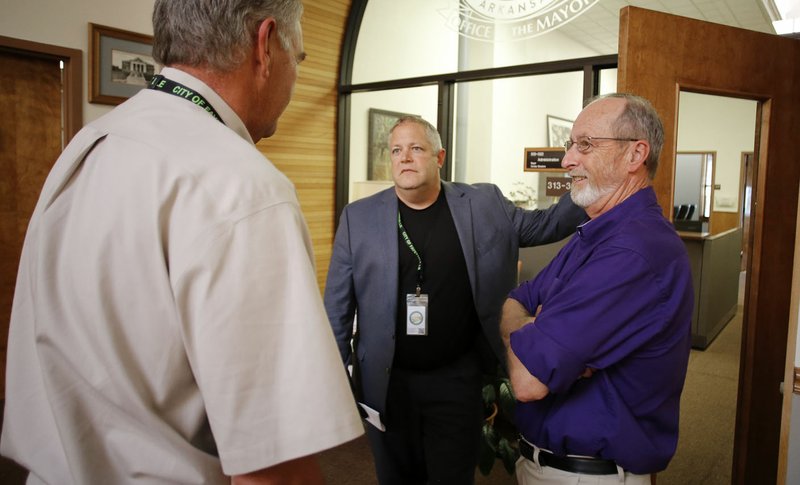Pay for public employees in the region's largest cities often lags the private sector, a local expert said, and that includes top positions such as mayor.
The four cities use surveys to help determine pay. They take into account a job's responsibilities, education and other qualifications and compares it to salaries in other cities.
Fayetteville is in the process of interviewing vendors to do its salary survey, which the city does every two years, said Paul Becker, chief financial officer. Springdale and Rogers work with the Johanson Group, an outside business. Bentonville does its own surveys every two to three years and check trends annually, said Ed Wheeler, Bentonville's human resource manager.
Every Arkansas city has decided its own public employee salaries since 1976, said Don Zimmerman, executive director of the Arkansas Municipal League.
"I don't know how much more democratic that could be," Zimmerman said. "It has stood the test of time and never has anyone tried to change it."
City employees often don't make as much as their private sector counterparts, said Bruce Johanson, partner of Johanson Group.
Each of the mayors said he doesn't directly take into account equivalent private sector jobs when determining salary recommendations. But it's important to keep competitive, they added.
Rogers Mayor Greg Hines said the trade-offs can pay off financially in the long term.
"We have in Arkansas a very, very strong pension system that contributes to their 401(k) and cost effective health care," he said.
Staying competitive with the private market is more important when it comes to certain positions, the mayors said.
"The private sector can be a consideration," Johanson said. "It takes a balanced approach if you have a position that needs the skill sets from both the private and public market."
Engineers and attorneys working for Northwest Arkansas cities rank higher in pay. It comes down to the education and responsibility, said Bentonville Mayor Bob McCaslin and the other mayors. With only one attorney and a paralegal, the workload in Bentonville is greater, McCaslin said.
"We are probably the best buy for the buck," he said.
Northwest Arkansas' unemployment rate could impact wages for public employees, Johanson said. The rate was 2.8 percent in June, according to the U.S. Bureau of Labor Statistics.
"On a tighter labor market you can expect income to go up to get and retain employees," he said.
Another influential factor for the area, when compared to the rest of of the state, is the number of vendors, Johanson said. "The wage structure on the whole is higher than other parts of the state."
While many may debate on whether private vendors, such as Wal-Mart, influence the public sector, Johanson said he thinks it does.
"Its a rising tide for the market as a whole," he said. "People are being paid at a higher level in general. In our experience, we've seen that it can have an influence on what people want and expect to be paid."
Lonely up top
The mayoral salaries for the four largest cities in the area are noticeably lower than the annual mean wage of $162,960 for a private company's chief executive in Northwest Arkansas, according to the Labor Statistic Bureau.
Averaged together, Bentonville, Springdale and Rogers mayors make about $127,000 annually. Fayetteville is different because the chief financial officer and the chief of staff are both paid $121,534, which is more than Mayor Lioneld Jordan, who makes $119,246 annually.
Jordan has noted Fayetteville has long had a similar position titled chief of operations. Fayetteville is on its way to becoming the second largest Arkansas city, he said, which furthers the need to have a chief of staff.
"In our situation here, the chief of staff manages day-to-day operations. That doesn't mean I'm not involved in the day-to-day," Jordan said. "The mayor primarily sets vision and parameter. I do the day-to-day plus the meetings and conferences."
Each of the mayors said they aren't specifically looking to increase public jobs at the moment despite growth in the region. The area averages 2.6 percent annual growth, according to the Northwest Arkansas Council.
"We are a pretty lean machine, because we think that is the right way fiscally, but also that is what our community expects of us," Hines said of Rogers. "We are not bolstering up on employees because of bubbles of growth.
"I just always want to make sure we aren't overreacting or under-reacting to growth. We are very cautious of adding new positions because you rarely take them away, and they're not one time expense."
Fayetteville -- the fastest growing city in the state in raw numbers -- sees around 1,500 new residents a year. Jordan hinted the growth may soon lead to more positions, especially in safety, to keep public services up.
"With that growth comes more people and with those people come more stress on your government," he said.
Bentonville officials soon will discuss the expansion of its police and fire departments, McCaslin said.
Springdale has added to its police and fire staffs over the last year.
"As the population grows, we will have to do our best to keep up and increase our workforce," said Mayor Doug Sprouse. "Growth is always a challenge, but it is a good challenge to have."
NW News on 07/17/2016


